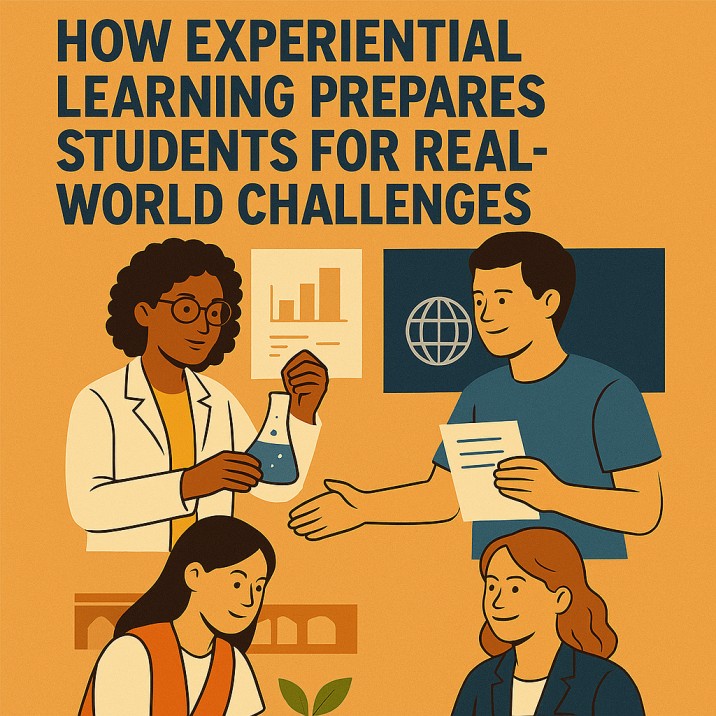17 Aug 2025
|
By: DSIS
An understanding of the theory alone does not prepare students for the future in the fast-evolving world that we live in today. Society, the workforce, and employers are on the lookout for new-age innovative problem-solver thinkers. This is precisely where, experiential learning, comes in. Experiential learning enables students to gain knowledge through direct encounters, and gives them the opportunity to learn beyond the classroom.
What is Experiential Learning?
Learning by doing is known as experiential learning, which is the kind of learning students achieve through completing projects, simulations, internships, and fieldwork. Experiential learning focuses on the application of knowledge and is built on the student’s self-reflection with the purpose of understanding concepts. This goes a long way in ensuring that students perform not only for grade but learn concepts that are essential for life.
An educational theorist, David Kolb, suggests that experiential learning is a four-stage process: experience, reflection, conceptualization, and experimentation. This cycle helps in the development of critical thinking, and the ability to adapt to changing circumstances, which is a form of creativity, all of which are the hallmarks of the modern world.
Building Problem-Solving Skills
Experiential learning enhances one's ability to effectively solve problems. Problems in the real world are rarely simple. Students are able to analyze problems, come up with solutions, test, and make adjustments through project-based learning, design-thinking workshops, or community-based projects. This iterative approach helps students prepare to manage real-life complexities of life and the need to adapt to different circumstances.
Developing Collaboration and Communication
Working with one's colleagues as well as proper communication is as important as expertise in the given profession. Experiential learning acquires students to take part in group projects, role-play activities, or entrepreneurial activities, enabling students to learn from each other and practice real-life empathy, leadership, and communication. Students are able to share ideas, articulate concepts and defend positions, and work towards the mutual agreement while they negotiate differences, which is some of the important skills needed for successful future professions.
Sparking Innovation and Creativity
With the world changing rapidly, innovation is more important than ever. The world’s fastest changing arena; education, is designed to maximize learning through innovation and experimentation. Through guided freedom, students are able to explore, develop, and execute their own ideas in the form of prototypes, concerts, or cultural events, even social initiatives. The ability to explore, fail, and innovate fosters resilience and adaptability in students, and is essential in today’s world.
Merging Theory with Practice
Experiential learning is the best answer to the infamous question, “When will I apply this in the real world?”. You can understand this best with the example of a field-program participant in science, or a business project initiate in commerce. They transcend the boundaries of the classroom. Mastering practical skills cannot be underestimated in today’s world, as the education system tends to overlook the connection of theoretical frameworks to the practical world.
Preparing for Careers and Beyond
Experiential learning integrates theory with practice. Community service, industry visits, and internships provide students with actual work exposure and assist them in identifying their strengths and weaknesses. Such experiences, in addition to building confidence, cultivate adaptability and a professional outlook. With this approach, schools ensure students not only possess rigorous academic knowledge, but also possess essential life skills.
A Model for the Future
These schools are a welcome change because they focus on the skills students possess and not the grades they achieve. Such schools are at the forefront of innovation because they blend traditional with project-based learning, after-school activities, and leadership programs. The
best school in Faridabad is a perfect example of this blend where the philosophy of education is rooted in more than just the classroom.
conclusion
Expending learning resources is not an option, especially with learning technology making it easier to give students the immersive experiences they need in a world that increasingly values capabilities over credentials. Rote memorization is obsolete, and in this new world, students require reflection and application to foster the skills they need to navigate challenges, and start conversations on problem-solving, communication, adaptability, and travel-sized versions of the multitude of tools available. Students in the 21st century face tremendous challenges, fueled by technology.
